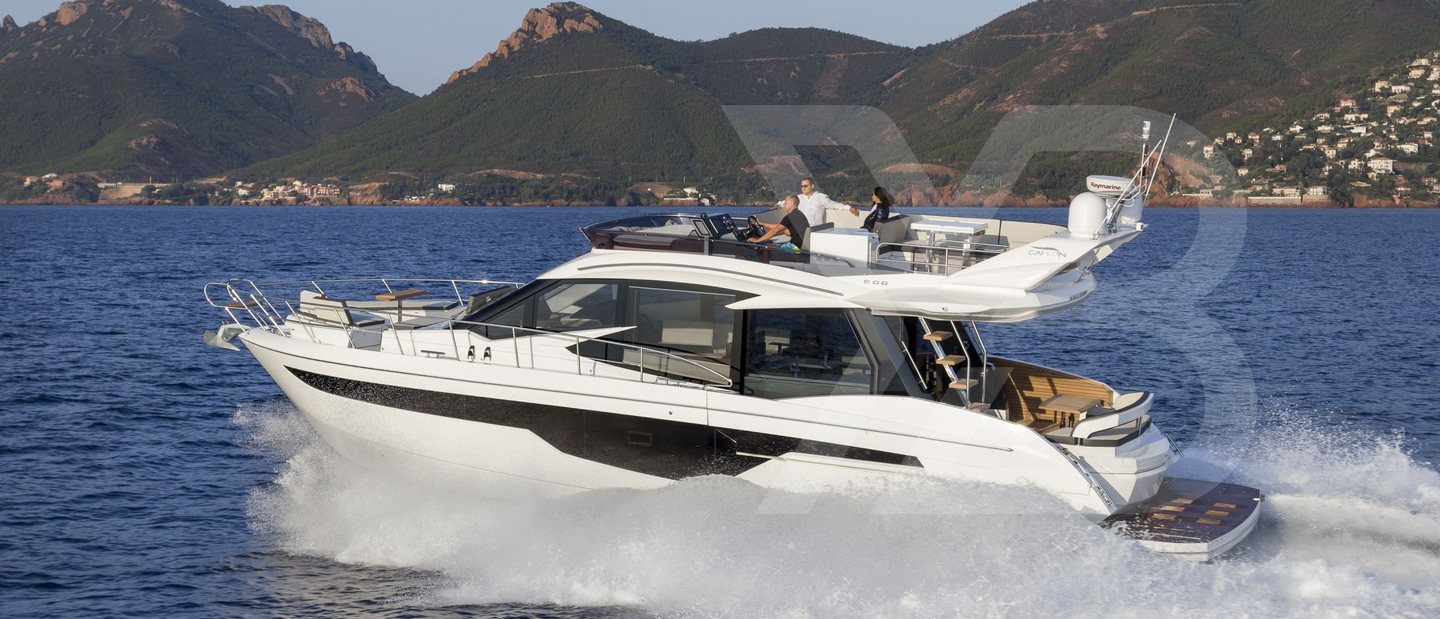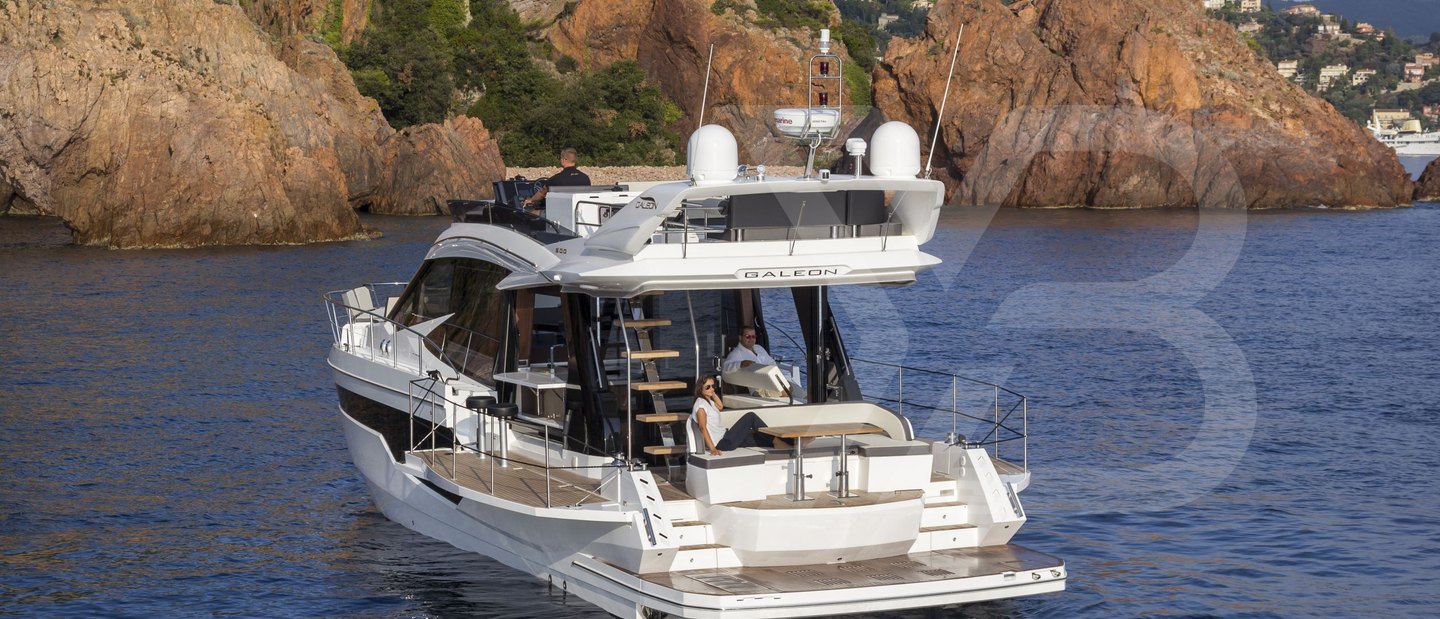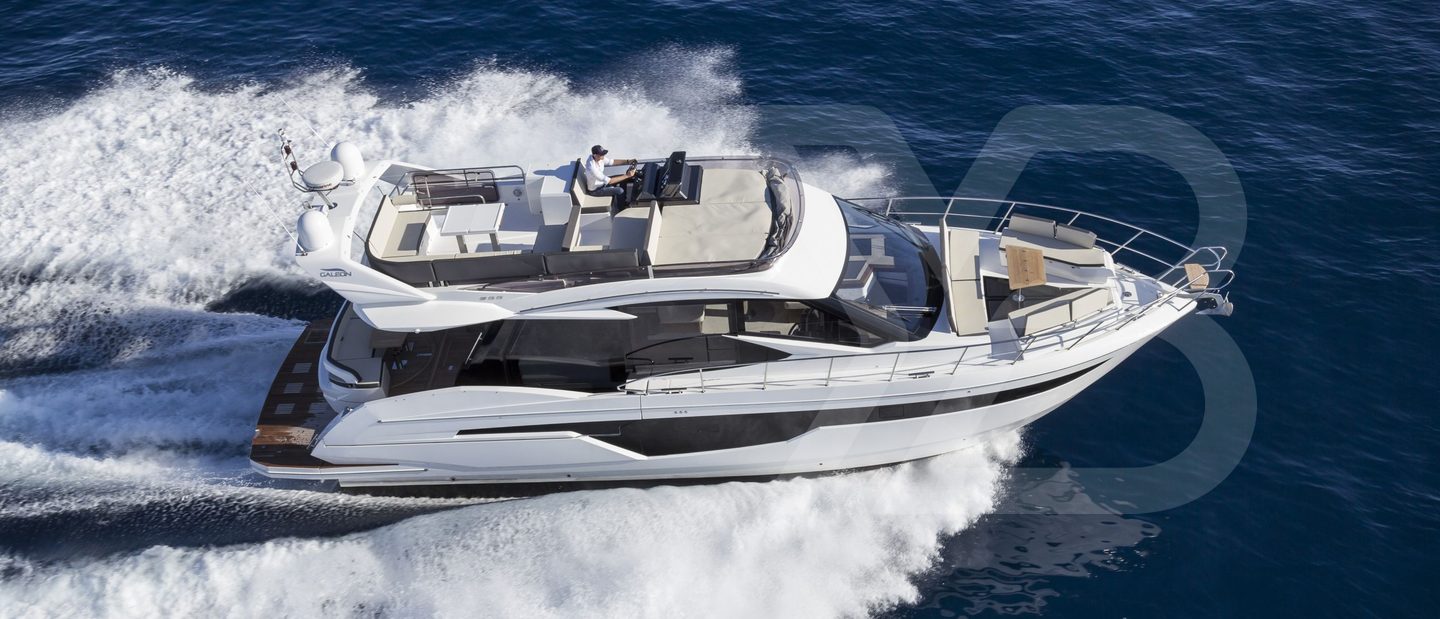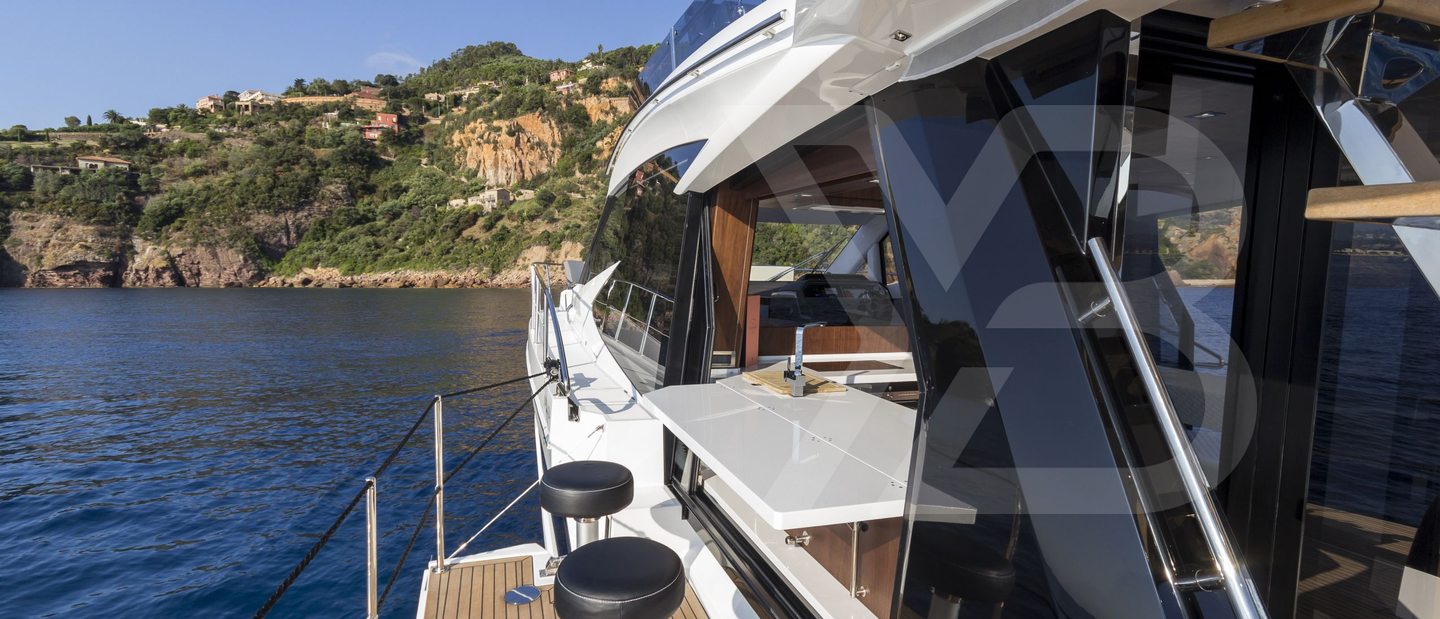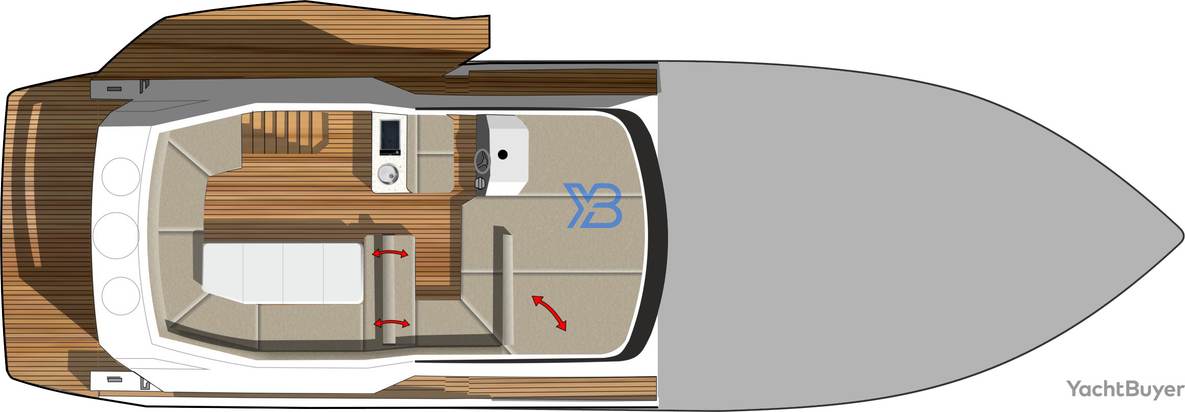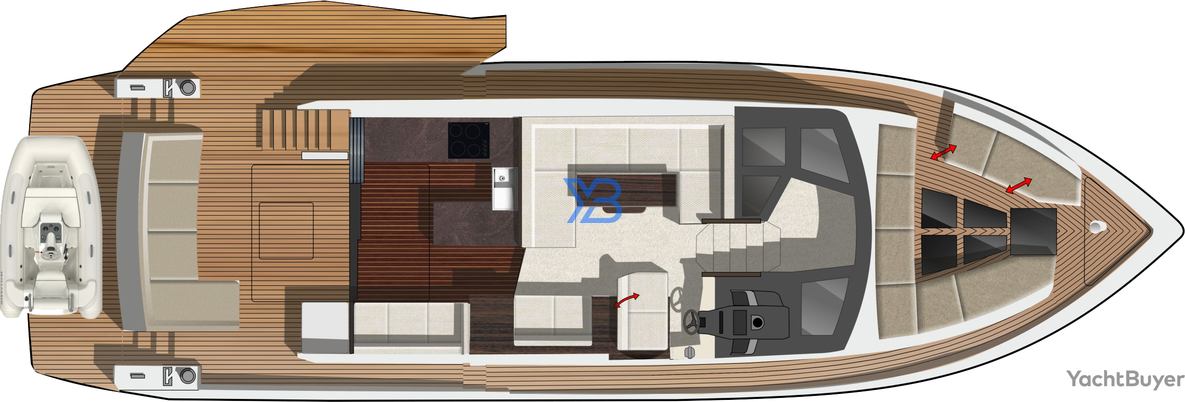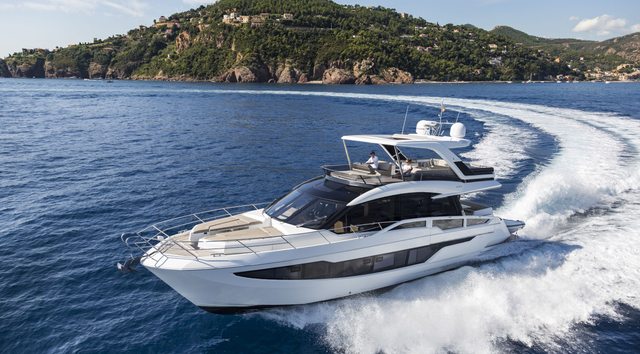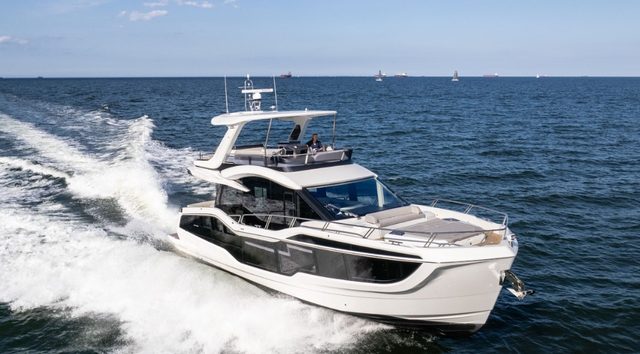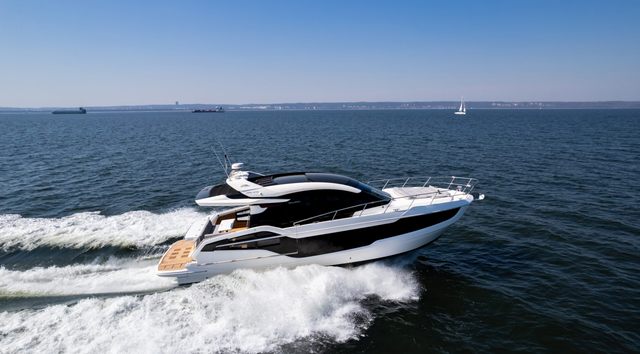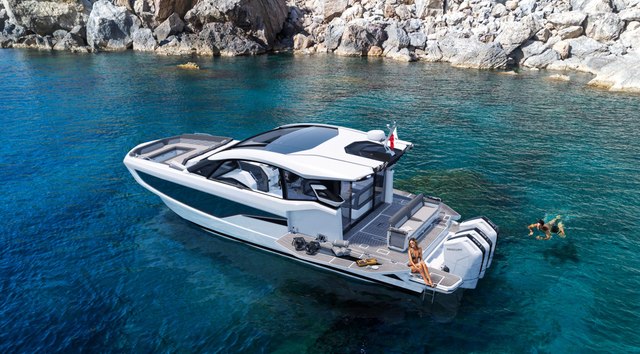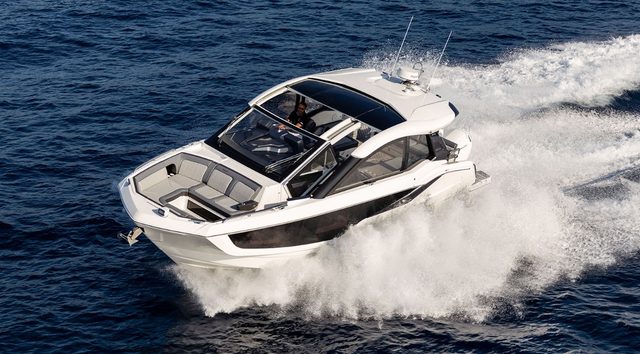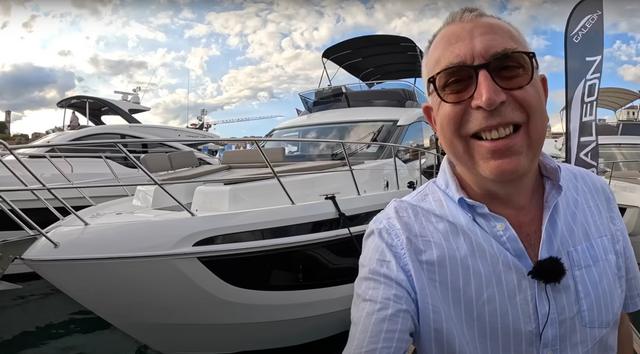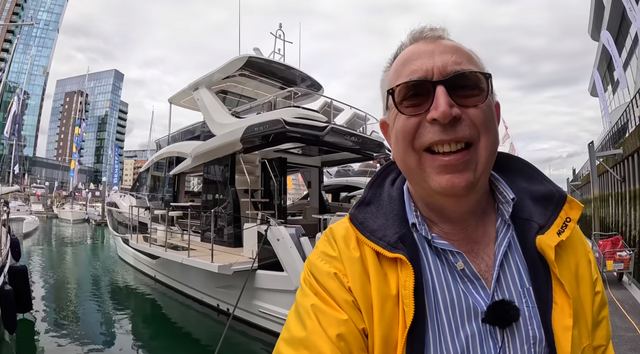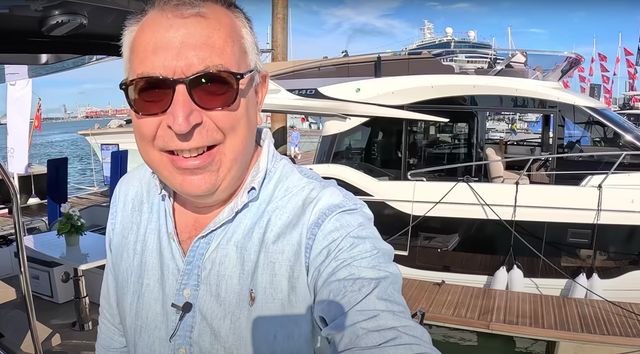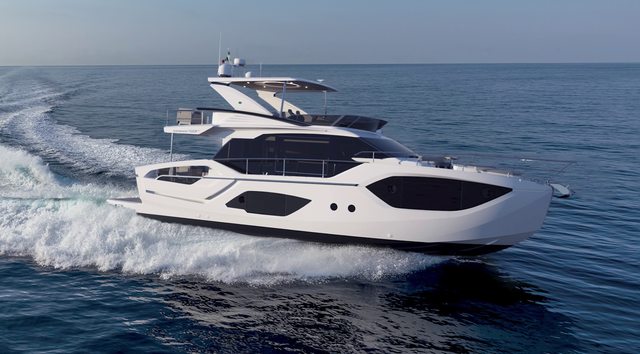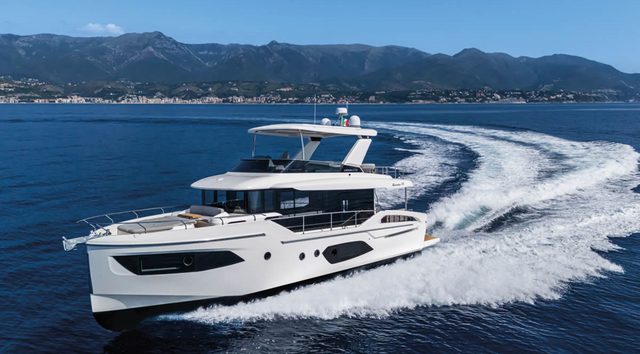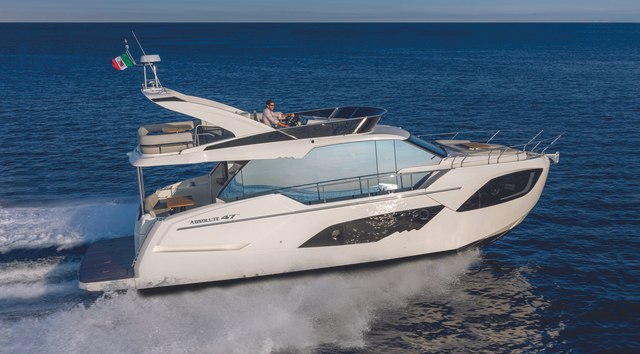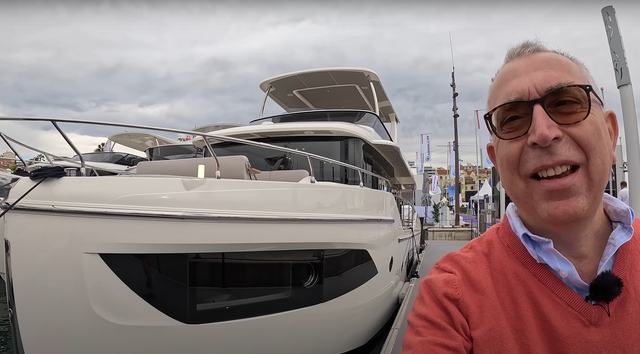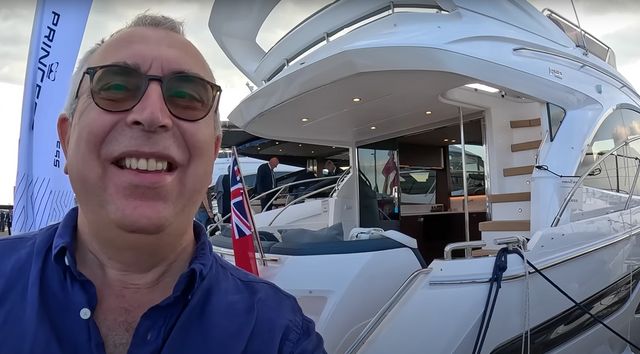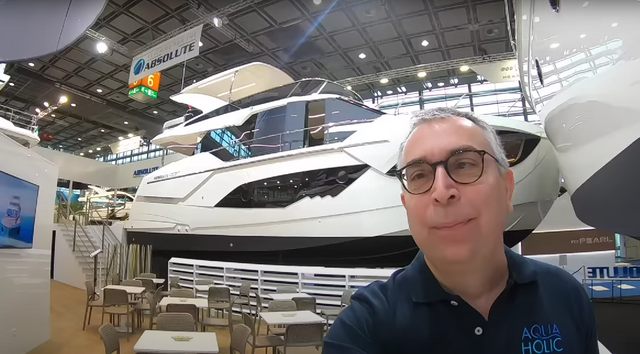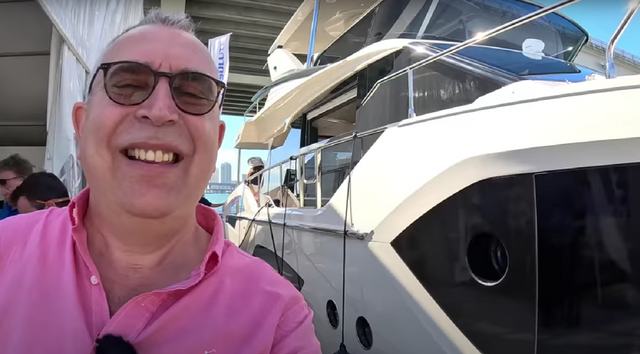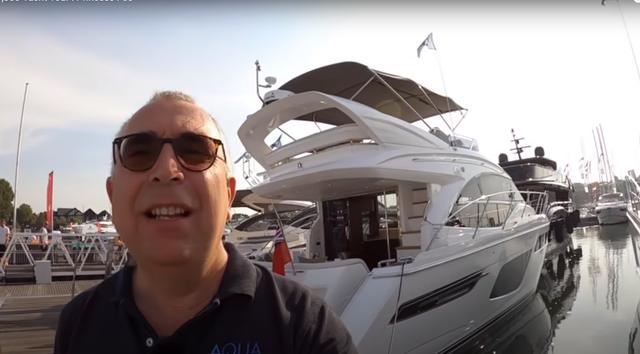Galeon's range is a sprawling mix of sportscruisers, flybridges, and sportsbridges from 10-22m, but the 500 Fly is at the heart of what it does best. At first glance, it looks like a typical 16m flybridge with masses of glazing and a comfortable three-cabin interior but this is one of the most inventive boats in the class.
The innovative cockpit features folding balconies with the option to have a rotating dinette with a built-in tender garage. Clever stuff, but is there substance behind these head-turning gadgets? Keep reading to find out.
Test & Review Video
The 500 Fly is available with three shaft drive engine choices with an upgrade to IPS also on the options sheet. You'll pay six figures for that upgrade, however, so most will no doubt opt for one of the shaft options, which includes Volvo Penta D8 600hp, D8 670hp, and D11 725hp twin diesels.
Unless the boat has a particularly light spec the smallest 600s will likely struggle to shift the 500 without feeling strained so the more powerful engines would be a wise choice. If the boat is fitted with weighty options like the beach club and flybridge hard top then it would be sensible to opt for the 725s.
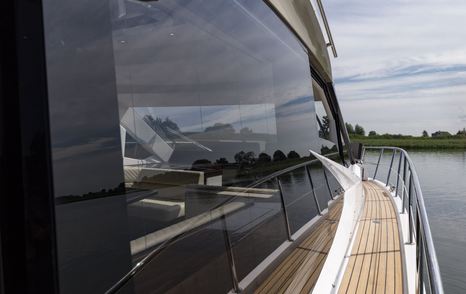

Around the Marina
Don't be dismayed that the IPS option with its joystick is such an expensive option because, with twin shafts and Sleipner's excellent proportional bow thruster, the 500 Fly is a friendly boat to negotiate around the marina. For extra peace of mind, a stern thruster is an option and that will give finer control of the stern when squeezing into tight berths, especially when mooring stern-to in the Mediterranean style.
The twin props provide great bite in and out of gear so twisting the boat into position is easy and with such a great view out from the lower helm and a large electric window, it's just as comfortable to berth the boat from the lower helm as it is from the raised position on the flybridge.
It's not quite as easy to crew as the likes of the Sealine F530 and Absolute 47 Fly because it doesn't have a side door at the helm but the decks are safe and easy to navigate.


At Sea
Our test boat had pretty much the highest spec you could choose for a 500 Fly with all of the most desirable options in place. The expectation might be that this would make for a heavy and lethargic driving experience but that isn't the case. The boat on test had the largest twin 725hp shaft drive engines and they made light work of nipping the boat onto the plane and up to its natural cruising speed of 22 knots. Flat out we achieved 32 knots.
The hull is quiet, soft riding, and confident through chop, though it must be said that conditions weren't particularly taxing during the test. Considering that the engines are mounted beneath the saloon floor, sound levels are managed well, too, which is maybe no surprise given the amount of insulation in the engine room.
The handling is as much of a pleasant surprise as the performance, the light, responsive steering making the 500 a sportscruiser baiting prospect in the twists and turns. The IPS version is likely to feel a little more detached from the helm(s) and not be quite as agile as the shaft drive alternative, which has plenty of bite in the water from its twin rudders.
From the pen of British designer Tony Castro, the 500 Fly is a striking boat that has almost more glazing than GRP in both its superstructure and topsides. The profile is quite busy, certainly compared to the likes of the Prestige 520 and Princess F50, but it’s a boat with a host of tricks up its sleeve. At the push of a couple of buttons, the aft end of the deck unfolds creating two substantial balconies that almost double the usable space available. Opt for the rotating cockpit seating and you have undoubtedly the most appealing cockpit in the class.



What’s most impressive about these gizmos is that they don’t compromise the 500’s workings as a boat and appear to have no negative effect on performance and handling despite their added weight. The interior isn't quite as inventive as the exterior but there are lots of different colors, trim, and upholstery choices. The physical three-cabin layout of the lower deck is fixed, however.
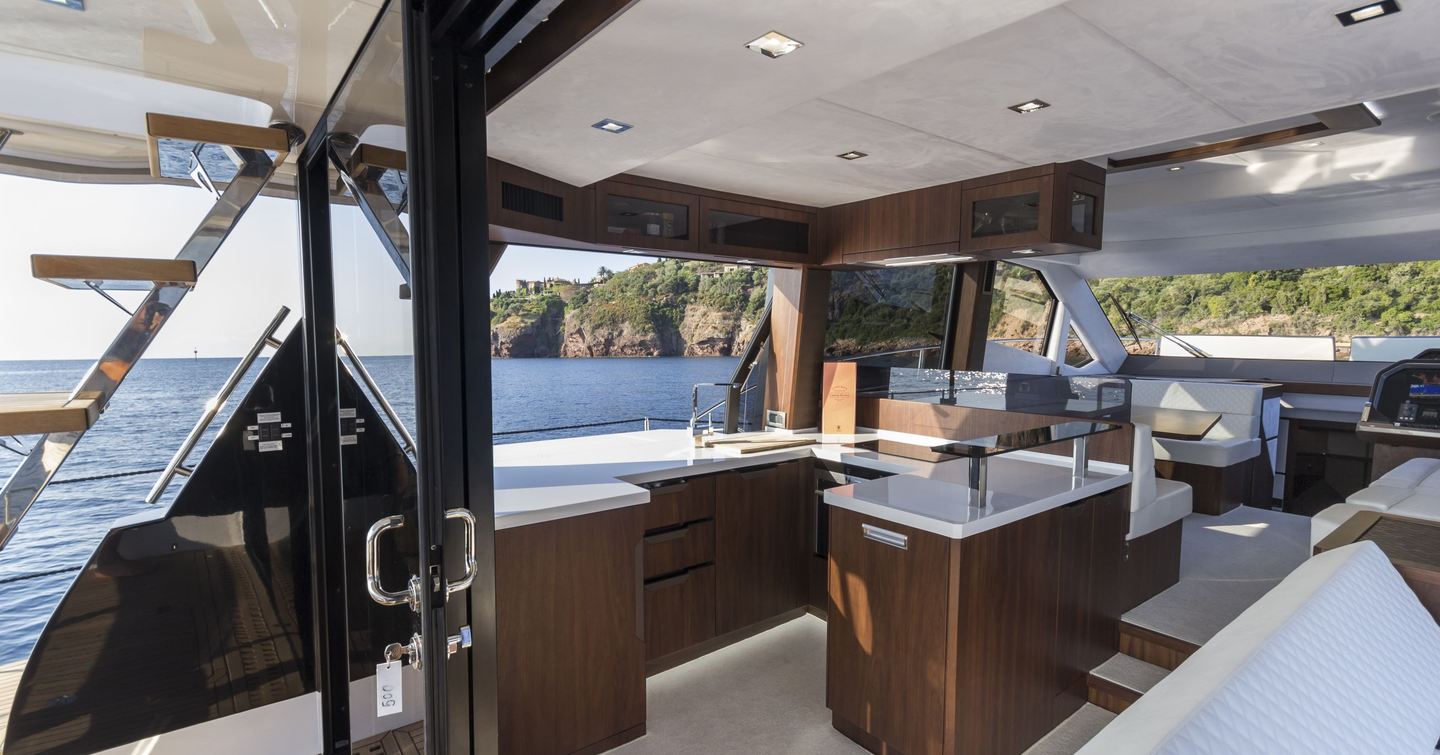
Quality Street
There was a time when buyers would turn their noses up at boats produced in Poland but it doesn’t take long aboard this model to realize that Galeon knows what it’s doing when it comes to fit and finish. Components are expensive, the interior woodwork is excellent and there is a general feeling of solidity that surpasses many of its mass-produced rivals.
With such a functionality-packed cockpit it makes perfect sense for the 500 Fly to have an aft galley layout. The sliding windows on either side of the saloon and pop-up bar section allow the galley to double up as a service area for the cockpit but it’s also an easy passage from the cooking area to the forward dinette if guests are dining inside.
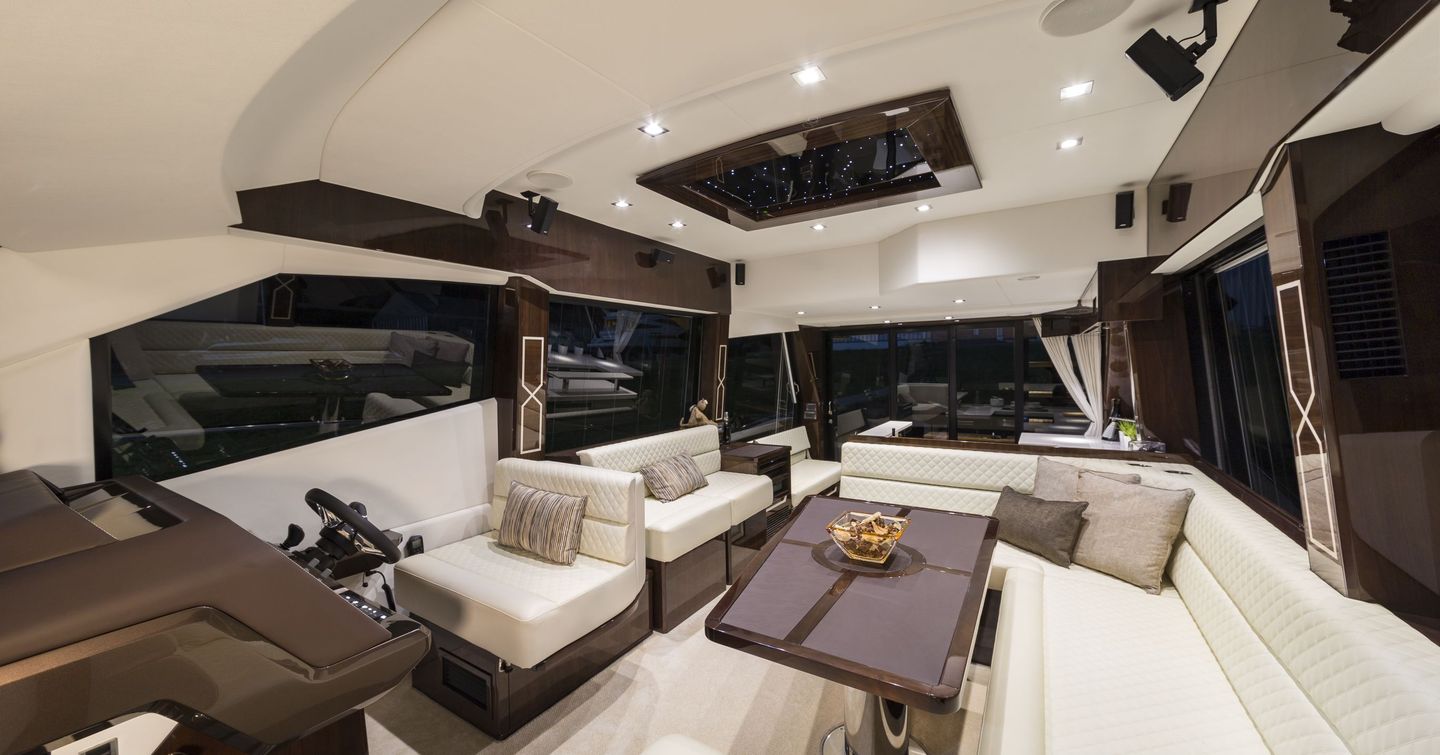


The two-way seat opposite the galley is another clever piece of the design that can either serve as a cozy perch opposite the galley or, with the window open and backrest flipped into the boat, an equally lovely spot to gaze out over the water with a coffee.
The boat is a little short of fridge/freezer space in the saloon with just a rather small under-counter unit compared to the domestic-size fridge/freezers that some rivals manage to include in their galleys. That said, dry storage is very good throughout the saloon and there’s space for a dishwasher at the end of the galley return.


Time For Bed
The three-cabin, two-bathroom layout of the lower deck is fixed but the standard arrangement works well. The star of the show is the full-beam master ensuite, which is well appointed, spacious, and has over 6ft 1in of headroom throughout. The VIP isn’t far behind and benefits from long strips of glazing on either side and an oversized skylight that will draw plenty of natural light into the cabin during the day.
The VIP shares its ensuite with the third cabin but it’s a good size so this shouldn’t be too much of an issue. The third cabin is bunk beds only and is probably best suited to kids but the berths are large enough for adults to be comfortable during shorter stays.
It’s a tale of two helms on the 500 Fly as the lower helm hits all the right notes whereas the one upstairs has room for improvement. The main issue is that the latter has very little adjustment so you can’t tweak the driving position to suit your body shape. The small bench seat is fixed and therefore you find yourself leaning a long way forward to reach the MFDs (multi-function displays), which is where almost all of the major systems are controlled. That said the relationship between the wheel and throttles is good and the layout is clear and easy to use.


The driving position is much more intimate at the lower helm and controls fall to hand more easily. There is no side door but large electric windows on either side aid both ventilation and communication with those on deck. Later models don’t have the run of analog dials at the top of the dash, which is a shame as they look good and make it easy to quickly check that levels and temperatures are as expected. There is also quite a large blind spot to starboard due to the size of the windscreen mullion.
This is where the 500 Fly streaks ahead of its rivals. With the ‘beach club’ option, which includes the terraces and hydraulic bathing platform, plus the rotating dinette, there isn’t a boat in the sector that can compete with the socializing space of the 500 Fly.
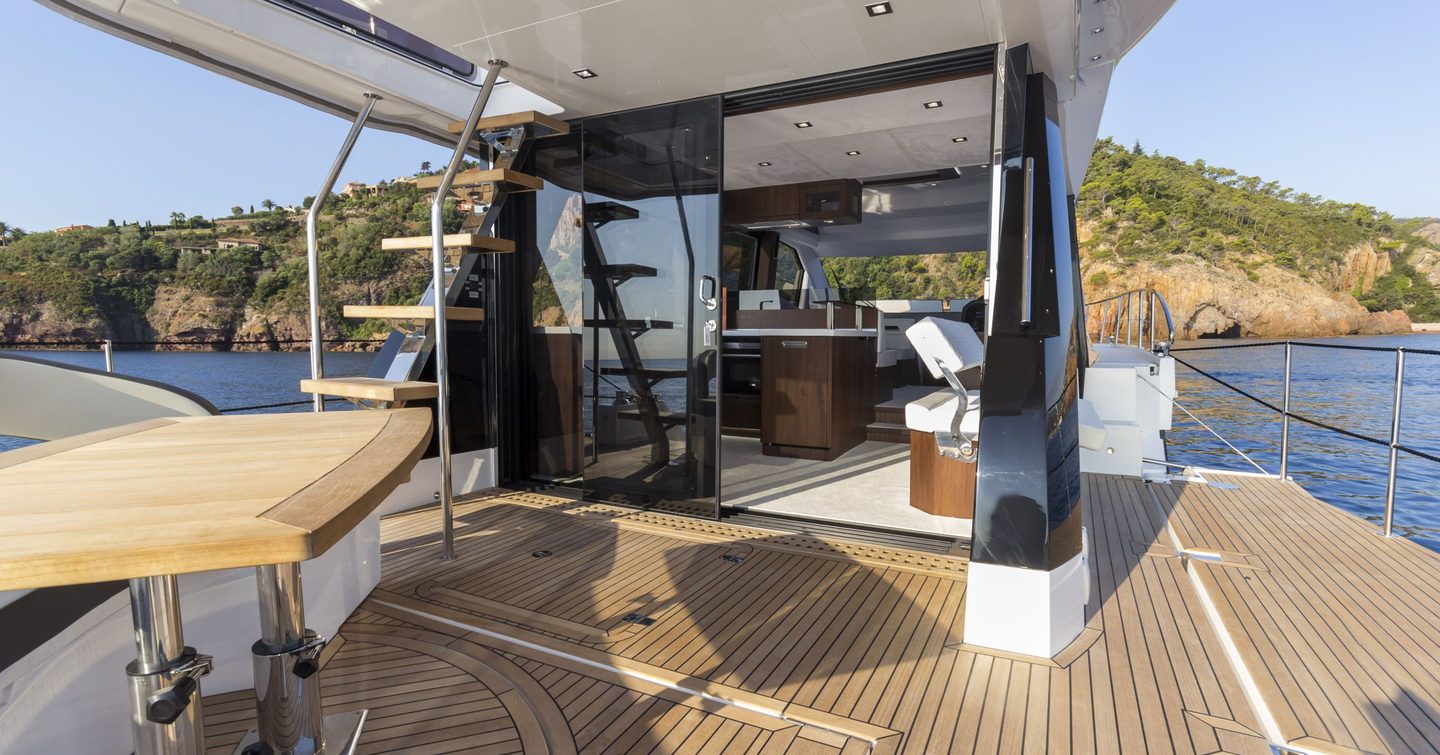


The cockpit grabs a lot of the attention for obvious reasons but there’s clever thinking on the foredeck as well. The optional sliding seats glide forward and out at the touch of a button to create passageways to the side decks and the simple but brilliant pop-up backrests make the bench seating much more comfortable if you’re sitting for sundowners.
The gadgets may appear complicated but their mechanisms are refreshingly simple in a bid to minimise the likelihood of malfunction or weighty repair bills. There are no gimmicks here, all of the toys genuinely improve life onboard the boat.


Flying High
Let’s not forget the flybridge, either. This is a really good space and large for a boat of this size. The small wet bar splits cooking and cooling facilities and is well placed to serve the large dinette at the aft end with dedicated sunbathing space forward of the helm. The shelter is provided by either a canvas bimini or a hard top, which is likely to prove popular. The headroom under the aft end of the top is a bit tight for those over 6ft but clearance improves forward where there is a built-in canvas sunroof.
Those who expect the Galeon to be much cheaper than its rivals because of its Eastern European roots may be in for a shock. The 500 Fly is unlikely to undercut its French and German rivals and maybe a little more expensive than most but, as has been covered already, you can see and feel where the money is being spent all over the Galeon. It’s a quality product and the touch points are top notch. Not many shipyards offer the five-year manufacturer warranty that Galeon does, either. Plus, with such clever deck spaces and the spacious interior, you certainly feel like you’re getting bang for your buck.
Our Options & Pick
Galeon's UK dealer, Approved Boats, has a sensible approach to pricing. Rather than offer a base boat and then add a load of extras, it offers a UK spec and a Med spec with all the necessary equipment included in the price.
The Med spec includes everything UK spec has and adds air-conditioning, an uprated generator, hydraulic passerelle, and - to help with the added weight - the mid-range D11 670hp engines as standard. You can add and remove items from this list as required but it makes for a much more realistic pricing strategy.
In terms of our pick, then, it somewhat depends on where you're going to keep the boat. The Med spec is the whole package and ticks most major options but it does command a chunky premium over the UK version.
The hard top isn't standard on either spec but we would go for it, both for the flexibility it adds to the top deck and for resale value, given that most buyers will be looking for it. We would avoid the smallest engine option.
It is not a cheap option but the Seakeeper gyro stabilizer is worth considering. That cockpit is fantastic but the shine will be taken off if the boat is bobbing like a cork at anchor.
Our Verdict
In a highly competitive sector, the Galeon 500 Fly has a true USP. The transforming cockpit is far more than some boat show gimmick or quayside theatre, it genuinely improves life onboard and provides a significant increase in usable living space. Underneath all of this innovation, however, there is a really solid cruising machine; Galeon and Tony Castro’s design team haven’t lost sight of how the 500 needs to function as a boat. It’s well-built, safe, and bristling with smart and practical touches.
It’s a shame that the IPS option is so expensive but around the marina and at sea the 500 Fly is well-mannered, predictable, and easy to control. It’s also quite a lot more fun to drive than you might expect.
It isn’t the prettiest boat in its class or the biggest, but it’s an accomplished all-rounder with an ace up its sleeve.
Reasons to Buy
- Outstanding functionality
- High quality interior
- Engaging handling
- A lot of boat for the money
Things to Consider
- Upper helm ergonomics
- IPS option is prohibitively expensive
- Third cabin has bunks
Looking to own a Galeon 500 Fly? Use YachtBuyer’s Market Watch to compare all new and used Galeon 500 Fly Boats for sale worldwide. You can also order a new Galeon 500 Fly, customized to your exact specifications, with options for engine choice and layout configuration. Alternatively, explore our global listings of new and used boats for sale and find your perfect boat today!
Rivals to Consider
The 16m flybridge sector is one of the most competitive in the market with most of the leading brands offering a decent contender at this size. Few rivals offer the innovation of the Galeon but the Polish boat faces stiff competition from a variety of established shipyards.
First launched in 2015, the Sealine F530 boasts an impressively voluminous interior. Though it may not possess the Transformer-like tricky of the Galeon’s main deck it has more options when it comes to the layout of the lower deck with the choice of a twin or double third cabin and a storage room or single crew cabin at the stern. The two engine options are both IPS (either IPS700 or 800) for a top speed with the latter of 30 knots.
The Prestige 520 is a handsome machine with clean lines and a sleek profile. Like the Sealine it is only available with IPS and, though smooth and refined, can’t quite compete with the performance of the shaft drive Galeon. There are three cabins on the lower deck; two doubles and a twin with separate access to the master ensuite directly from the saloon. As with the Galeon, a tender garage is an option but you sacrifice the crew cabin.
The Princess F50 is smaller than the Galeon but it sets the benchmark for fit and finish on a boat of this size. Its on-water dynamics are also very polished with near 35-knot performance from twin 600hp Volvo Penta IPS800s and a smooth-riding Olesinski planing hull. You do feel the boat’s smaller dimensions within the interior where the third cabin has bunks instead of twin berths and there is no crew cabin option but this is a classy operator with strong residuals.
The Absolute 47 Fly may be shorter than the 500 Fly but its ever so slightly wider beam says a lot about where the focus is for the Italian boat. The interior feels ridiculously spacious for a boat of these dimensions and the offset berth in the forward master makes the most of the available space. There isn’t a crew cabin but the 47 makes up for this with probably the most comfortable cabin spaces of all the boats mentioned here. Absolute builds its boats to cruise in the low 20s, so performance is a little down on the others, but it’s a capable machine out on the water.
Considering a new boat? Explore Galeon's entire current range to find the model that best suits your needs, and compare it with alternatives from competitors to ensure you make the perfect choice.
Specifications & Performance
- Builder Galeon
- Range Flybridge
- Model 500 Fly
- Length Overall 16.2m
- Beam 4.46m
- Draft(full load) 1m
- Hull GRP
- Cabins 3
- Berths 9
- Crew 1
- Cruising Speed
- Max Speed
- Fuel Capacity 1,800 Litres
- Fresh Water Capacity 650 Litres
- Engine Model 2x Volvo Penta D11-670
- Engine economic speed 8.3 knots
- Engine max range (speed type) 484.8 (nm)
Performance Data
Galeon 500 Fly version 2019. *Data collected by Yacht Buyer during testing.
Test Engines Twin Volvo Penta D11-670
- RPM
- Knots
- Liters Per Hour
- Liters Per Mile
- Range (nm)
- Decibels
-
- ECO
- 800
- 7.4
- 16
- 2
- 687
- 63
-
- 1,000
- 8.8
- 31
- 4
- 409
- 67
-
- 1,250
- 10.2
- 57
- 6
- 258
- 68
-
- 1,500
- 12.0
- 95
- 8
- 182
- 70
-
- 1,750
- 16.8
- 133
- 8
- 182
- 72
-
- CRUISE
- 2,000
- 22.3
- 169
- 8
- 190
- 74
-
- 2,250
- 27.6
- 216
- 8
- 184
- 76
-
- MAX
- 2,500
- 32.0
- 286
- 9
- 161
- 79
Yacht Load: 0 Litres of water 50 Litres of fuel 4 members of crew air temperature of 25 °C
Sea Conditions: F1 and calm. Figures are taken from onboard readings, yours may vary depending on load and sea conditions. The range figures include 20% in reserve.
Interested in a 500 Fly?
NEW Build
Find your local dealer for a personalised, no-cost consultation
or just request
Brochures & Pricing
Used & In Stock
Looking for a ready-to-go 500 Fly or pre-owned options? Explore all inventory of the 500 Fly available worldwide
